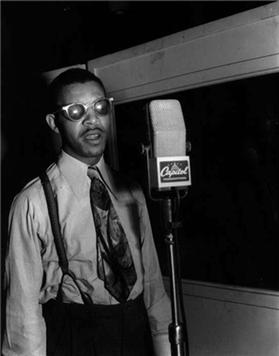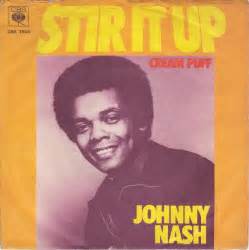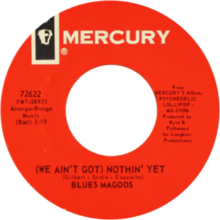
Mathis James Reed was an American blues musician and songwriter. His particular style of electric blues was popular with a wide variety of audiences. Reed's songs such as "Honest I Do" (1957), "Baby What You Want Me to Do" (1960), "Big Boss Man" (1961), and "Bright Lights, Big City" (1961) appeared on both Billboard magazine's R&B and Hot 100 singles charts.

Status Quo are a British rock band. The group originated in London and was founded in 1962 by Francis Rossi and Alan Lancaster while they were still schoolboys. After a number of name and lineup changes, which included the introduction of John Coghlan in 1963 and Rick Parfitt in 1967, the band became The Status Quo in 1967 and Status Quo in 1969. As of 2022, the group have been active for 60 consecutive years.

The Blues Magoos are an American rock group from The Bronx, a borough of New York City, United States. They were at the forefront of the psychedelic music trend, beginning in 1966. They are best known for the hit song "(We Ain't Got) Nothin' Yet", their only single to reach the Billboard top fifty.

David Louis Bartholomew was an American musician, bandleader, composer, arranger, and record producer. He was prominent in the music of New Orleans throughout the second half of the 20th century. Originally a trumpeter, he was active in many musical genres, including rhythm and blues, big band, swing music, rock and roll, New Orleans jazz, and Dixieland. In his induction into the Rock and Roll Hall of Fame, he was cited as a key figure in the transition from jump blues and swing to R&B and as "one of the Crescent City's greatest musicians and a true pioneer in the rock and roll revolution".

Albert George Hibbler was an American baritone vocalist, who sang with Duke Ellington's orchestra before having several pop hits as a solo artist. Some of Hibbler's singing is classified as rhythm and blues, but he is best seen as a bridge between R&B and traditional pop music. According to one authority, "Hibbler cannot be regarded as a jazz singer but as an exceptionally good interpreter of twentieth-century popular songs who happened to work with some of the best jazz musicians of the time."

The Best of The Byrds: Greatest Hits, Volume II is the third greatest hits album by the American rock band the Byrds, but only the second to be released in the United States, since the earlier The Byrds' Greatest Hits Volume II had only been issued in the UK. The album was released in the U.S. by Columbia Records on November 10, 1972 in lieu of any new Byrds' product during that year. It spent a total of thirteen weeks on the Billboard Top LPs & Tapes chart and peaked at number 114.

"You Ain't Seen Nothing Yet" is a song by Canadian rock band Bachman–Turner Overdrive (BTO). The song was written by Randy Bachman for the band's third studio album Not Fragile (1974). It was released as a single in 1974, with an instrumental track "Free Wheelin'" as the B-side. It reached the number one position on the Billboard Hot 100 singles chart and the Canadian RPM chart the week of November 9, 1974, as well as earning the band their only major hit single in the United Kingdom, peaking at number 2 on the UK Singles Chart. The follow-up single, "Roll on Down the Highway", was also a minor UK hit.

"Stir It Up" is a song composed by Bob Marley in 1967 and first recorded by the group Bob Marley and the Wailers that year and issued as a single. It was later covered by American singer Johnny Nash on his 1972 album I Can See Clearly Now. The following year, Marley and the Wailers re-recorded the song for their album Catch a Fire.

Picturesque Matchstickable Messages from the Status Quo is the debut studio album by the English rock band Status Quo, released in September 1968. It features several covers, including "Green Tambourine" by The Lemon Pipers.
Dyke and the Blazers was an American funk band led by Arlester Christian. The band was formed in 1965, and recorded up until Christian's death in 1971. Among their most successful records were the original version of "Funky Broadway" (1966) and "Let a Woman Be a Woman" (1969).

"Only Women Bleed" is a song by American rock singer Alice Cooper, released on his debut solo studio album Welcome to My Nightmare (1975). It was written by Cooper and Dick Wagner and was the second single from the album to be released.

"No Reply at All" is a song by the English rock band Genesis, released as the lead single in the US from their eleventh studio album, Abacab (1981). It was not released in the UK, where "Abacab" was the first single. The US single release edit omits the second verse of the song as it appears on the Abacab album.
"(Now and Then There's) A Fool Such as I" is a popular song written by Bill Trader and published in 1952. Recorded as a single by Hank Snow it peaked at number four on the US country charts early in 1953.

"Volcano" is a song performed by American popular music singer-songwriter Jimmy Buffett. It was written by Jimmy Buffett, Keith Sykes, and Harry Dailey and released as a single on MCA 41161 in November 1979. The song was first released on his 1979 album Volcano and reached No. 66 on the Billboard Hot 100, as well as peaking at No. 43 on the Hot Adult Contemporary Tracks chart.

Psychedelic Lollipop is the debut album by the American rock band the Blues Magoos, and is one of the first records to have the word “psychedelic” on the sleeve. Their single “(We Ain't Got) Nothin' Yet” was their most successful effort, rising into the Top 10 on many national charts. Guitarist Emil “Peppy” Thielhelm was 16 years old at the time of the single’s release.
"Tramp" is a soul blues song with funk elements, written by West Coast blues artists Lowell Fulson and Jimmy McCracklin. First recorded by Fulson in 1967, it was his highest-charting single since "Reconsider Baby" in 1954. It reached #56 in Canada. The song was covered by Otis Redding in a duet with Carla Thomas, and this version reached No. 2 on Billboard R&B chart.

"Somethin' 'Bout You Baby I Like" is a popular song written by guitarist Richard Supa in the early 1970s. The version by Tom Jones reached No. 36 in the UK in 1974. Glen Campbell and Rita Coolidge reached No. 42 in the US with their recording of the song in 1980.

"An American Dream" is a song written by Rodney Crowell. He recorded it under the title "Voilá, An American Dream" on his 1978 album Ain't Living Long Like This, and released it as the B-side to that album's single "(Now and Then There's) A Fool Such as I".

Basic Blues Magoos is the third album by the American rock band the Blues Magoos. It was released on Mercury Records on May 13, 1968. The album saw the group transitioning from psychedelia back to their blues rock roots. Though the album has gained more favor over the years, it was received as a disappointment upon its original distribution and failed to chart.
"Forty Five Hundred Times" is a song by British rock band Status Quo. It is the final track on their 1973 album Hello!, almost ten minutes long and regularly performed live. The group's frontmen, Francis Rossi and Rick Parfitt, have said it is one of their favourite songs by the band, with Parfitt using a special dropped tuning. While never released as a single, the song was #1 as voted by fans.
















